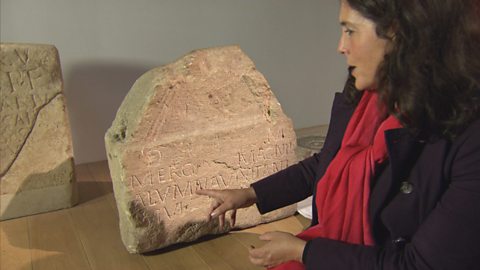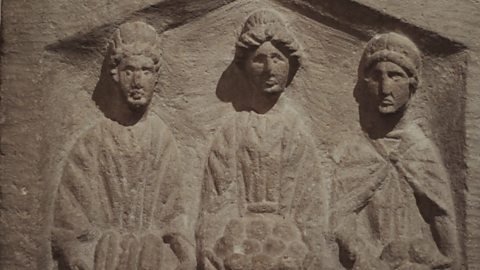BETTANY HUGHES: Close on 2,000 years ago, the Romans arrived to rule over Britain. Although they stayed here for almost 400 years, they still managed to live a Roman lifestyle. They ate Roman-style food, wore Roman-style clothes, and built Roman-style homes and public baths so they could carry on living the Roman way. They even brought their religious beliefs to Britain, including curses like this one.
Docilinus, son of Brucerus, to the most holy Goddess Sulis, I curse him who stole my hooded cloak, whether he be man or woman, slave or free. Goddess Sulis, inflict death and not allow him sleep, now or in the future, until he brings my hooded cloak back to the Temple of Sulis.
BETTANY HUGHES: Those blood-curdling words were scratched out onto a thin sheet of metal and tossed into the water here close on 2,000 years ago when most of Britain was part of the big Roman Empire. I'm in a city called Bath, and it's named after these Roman baths where ancient people used to come to get fit and to get clean, to meet friends. A bit like a modern-day leisure centre. So why, then, was somebody writing such horrible words onto a curse tablet and throwing it into that water?
The Romans believed the naturally warm water that bubbles up from the ground had special magical powers. The Romans called this place Aquae Sulis, and they named it after the goddess Sulis, who was an ancient goddess from Britain. She was thought to be terribly powerful and, in a way, her power was thought to actually live in these waters themselves. That's what explains these curse tablets. So, if somebody was really cross about something, what they'd do is they'd get one of these bits of metal, scratch out a message to Sulis, then fold it all up into a kind of package and throw it into the water. And this is that actual curse, scratched out by one very angry person nearly 2,000 years ago.
The man who wrote this one had obviously come here and had a lovely afternoon - he'd met friends, he'd gone to the baths, and then he'd got out and got himself dry, and somebody had stolen his cloak. It was probably the only one he had and it was freezing outside. He was in such a rage that he thought the only creature that could help him get it back was the goddess Sulis herself. This was a job for her. And this is what they thought she looked like. She's pretty impressive, isn't she? This head is made of bronze and it's been covered in pure gold leaf. Originally there'd have been a body too and the whole statue would have been housed in a special religious building called a temple. And people would travel from miles and miles just to pay their respects to her.
As well as taking revenge against people who'd been wicked, Romans believed that the goddess Sulis could cure them of illness. The Romans came here to be cured of all kinds of things, from skin diseases to just feeling troubled about life and even constipation. In return for Sulis's help, people threw gifts, known as offerings, into the baths. Over 12,000 of these Roman coins were found in the water. The brilliant thing about these coins is that when they were made, they had the face of the Emperor who was in charge put on one side, so we know exactly how old they were. This one's got the face of the Emperor Hadrian on it. You might have heard of him because he's the man who built Hadrian's wall.
Aquae Sulis was particularly important to Roman Britains, but public baths like this were a popular part of everyday life right across the Roman Empire. Although in some ways these places were a bit like a modern-day gymnasium or a leisure centre, they used very different kinds of equipment, didn't they?
Well, they did.
Well, this is certainly a very strange object, isn't it? It's something called a strigil, but it would be something that people used to clean themselves. The way this would work is that first of all someone would pour oil over you.
Yeah.
OK, thank you.
That's all right.
You would then scrape down like that to remove the oil, but in so doing, it would also remove all the dirt, all the gunk, all the nastiness, all the dead skin, that would all go and slosh. Away it would go.
So once you'd scrape yourself down, would you then end up in the water?
You would. At that point you would go into the water. You would rinse it all off. So if lots of people were doing that, you could end up with some pretty gunky water.
It must have been disgusting!
For people lucky enough to come here close on 2,000 years ago, Aquae Sulis was somewhere super special. This was a place you came to get fit and clean, to meet your friends or to curse your enemies. It was also somewhere you came to worship a great goddess for whom you had huge amounts of respect. So Aquae Sulis was somewhere you came to look after both your body and your soul.
Video summary
She visits the baths in the city of Bath that was known as Aquae Sulis.
It was named after the goddess Sulis because they believed her power lived in the water.
It shows how Romans used to place curses on others by scratching a curse on to metal and throwing it into the water.
The importance of such places is further shown by their belief that the water cured illnesses and, as thanks, people would throw gifts in to the baths.
Bettany Hughes looks closely at some of the coins that have been recovered and the other activities such as relaxation, fitness and washing.
This clip is from the series Roman Voices.
Teacher Notes
Children could write as a Roman about a visit to the baths with narrative about an argument where a character places a curse in the water, or they could write an adventure story going back in time to visit the Romans.
This clip is relevant to teaching History at KS2 in England, Wales and Northern Ireland and Second level in Scotland.
Children in Roman Britain. video
Bettany Hughes looks at the life of children in Roman Britain, discovering how tough life was for them - but also that it could be fun.

Women in Roman Britain. video
Bettany Hughes explores the lives of Roman women and looks at genuine artefacts to piece together a picture of what their life was like.

The Roman empire and its effect on Britain. video
Historian Bettany Hughes explores what made Britain so attractive to the ancient Romans that they made it a province of their great empire.
